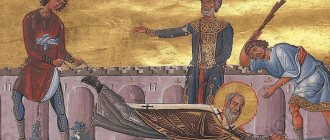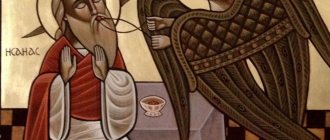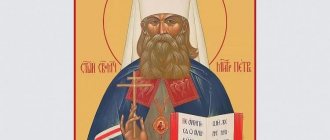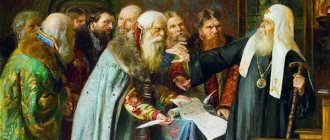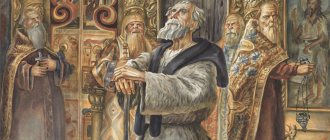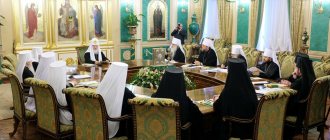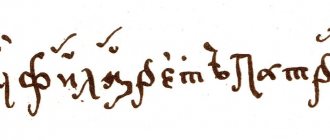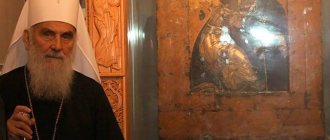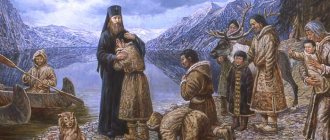See also: Isaac (name)
| Isaac (יִצְחָק) | |
| Sacrifice of Isaac. Caravaggio | |
| Floor: | husband. |
| Interpretation of the name: | "will laugh" |
| Name in other languages: | Greek Ἰσαάκ lat. Isaac |
| In other cultures: | Arab. إسحاق |
| Locality: | Mesopotamia, Canaan |
| Father: | Abraham |
| Mother: | Sarah |
| Spouse): | Rebekah |
| Children: | Esau, Jacob |
| Related events: | Sacrifice of Isaac |
IsaacIsaac
Isaac
(Hebrew יִצְחָק [Yitzhak] - lit. “will laugh”) - a character from the Pentateuch, a biblical patriarch, so named due to the special circumstances of his birth (Gen. 17:17-19; 18:12; 21:6). Son of Abraham and Sarah. Father of Jacob and Esau.
Biblical narrative
The son of the elderly Abraham and Sarah, who became the bearer of all the promises given to them.
When Isaac reached adolescence, Abraham received a command to sacrifice him, and Isaac meekly obeyed his father: a sacrificial knife was already raised over him, but was rejected by an angel. Isaac was married to the granddaughter of his Mesopotamian uncle Nahor, Rebekah, with whom he had two sons - Esau and Jacob. His life passed without other equally outstanding events, and he died at 180 years old, becoming one of the longest-lived patriarchs. Isaac is mentioned 86 times in Genesis, 32 times in the rest of the Hebrew Scriptures, and 20 times in the New Testament[1]. In the narrative, God calls Isaac his only begotten (only) son (Gen. 22:12, 22:16), although Abraham had a son, Ishmael, and 6 other sons.
Variations of the phrase “Abraham, Isaac and Jacob” appear 23 times in the Hebrew Scriptures[2].
He was first prophesied in (Gen. 12:7), born (21:2), died (35:29), and remembered (50:24).
When Sarah passed childbearing age and stopped menstruating (18:11), God told Abraham and Sarah that she would be able to give birth: Sarah laughed inwardly in doubt (18:10-12).
Isaac was born when Abraham was 100 years old, and Abraham circumcised Isaac when the boy was 8 days old (21:1).
Isaac is mentioned several times in the New Testament. Early Christians viewed Abraham's willingness to carry out God's command and sacrifice Isaac as an example of faith and obedience.
Isaac's marriage to Rebekah
After Sarah's death, Abraham began to think about choosing a wife for Isaac. Calling his faithful servant and housekeeper Eliezer, he ordered him to go look for a worthy girl in the ancient homeland of the Jewish tribe, in Mesopotamia. Eliezer took ten camels, loaded them with a lot of goods and set off. Soon he reached the city where Abraham’s relatives lived on the side of his brother Nahor.
Eliezer stopped outside the city, at a well. Meanwhile, the city girls went to the well for water. Eliezer decided: if I ask one of them for a drink and she gives water not only to me, but also to my camels, then I will know that God appointed her to be Isaac’s wife. Suddenly a young girl appeared in front of him, with a jug on her shoulder. She filled a jug from the well and wanted to leave. Eliezer ran to her and said: Let me drink from your jug. The girl gave Eliezer water and said: now I will draw for your camels too - and she began to give water to them. The faithful servant looked at the kind girl with tenderness. When she had given water to all the camels, he gave her a gold earring and two rings, asking: whose daughter are you, and is there a place for us to sleep in your father’s house? The girl answered that she was Rebekah, the daughter of Bethuel and the granddaughter of Nahor, and that in their house there was room and enough food for the cattle.
Rebecca at the well. Artist N. Poussin, ca. 1648
She ran home and told her mother everything that had happened. Rebekah's brother Laban went out to Eliezer and brought him to his parents' house. Touched by the hospitality, Eliezer told Rebekah's parents and brother about the purpose of his visit and announced that God himself had destined Rebekah to be Isaac's wife. Bethuel and Laban answered: Take Rebekah, and let her be the wife of your master's son. Eliezer took out silver and gold things and clothes and gave them to the bride, her mother and brother. The next morning, Rebekah's parents blessed her and sent her and Eliezer to Canaan. Approaching Abraham's tents, Eliezer and Rebekah met Isaac in the field. He brought the girl into his parents' tent, and she became his wife.
Jewish traditions
| This section is not completed. You will help the project by correcting and expanding it. |
Kabbalah reveals the correspondence between Isaac (Yitzhak) and the Sefira Gevurah
. [3]
According to rabbinic tradition, Isaac's age at the time of the sacrifice was 37 years old, contrary to popular beliefs about him as a child.[4] The rabbis also suggested that the cause of Sarah's death was the news of the planned sacrifice of Isaac.[4]
What does the name Rebekah mean?
The name is borrowed from the Bible and is of Hebrew origin (translated as “charming, captivating”): in the Old Testament, the wife of Isaac and the mother of the twins Esau and Jacob.
Interesting materials:
How much does it cost to call Tele2 abroad? How much does a bus fare cost in Moscow 2022? How much does a school pass cost? How much does it cost to undergo a medical examination for a health certificate? How much does it cost to advertise an apartment for sale on Domklik? How much does Alena Venum’s advertising cost? How much does a roll of chain-link mesh cost? How much does tuna fish cost? How much does the most expensive fur coat in the world cost? How much does the most expensive sweatshirt cost?
Notes
- Strong's Concordance
, Strong, James, ed.,
Isaac
,
Isaac's
, 3327, 3446,
2464
. - Eerdmans Dictionary of the Bible
,
Isaac
, p. 647. Events Circumcision | Sacrifice of Isaac Basic Concepts Jews | Abrahamic Religions | Cave of the Patriarchs | Abraham's bosom | Abrahamic covenant Children of Abraham Ishmael | Isaac In Islam Ibrahim | Hadjar | Ismail | Ishaq | Hajj | Eid al-Adha | Adnanites | Hitan from Arphaxad to Jacob Arfaksad · (Kainan)
·
Salah
·
Eber
·
Peleg
·
Raghav
·
Seruch
·
Nahor
·
Terah
· Abraham · Isaac · Jacobfrom Judah to David Judah
·
Perez
·
Hezrom
·
Aram
·
Aminadab
·
Nahshon
·
Salmon
·
Boaz
·
Obed
·
Jesse
· DavidBalaam Bilyam Job Job Abraham Abraham Sarah Sarah Isaac Isaac Jacob Jacob Moses Moshe Aaron Aaron Miriam Miriam Joshua Joshua bin Nun Phinehas Pinchas Anna Hannah Samuel Shmuel David David Solomon Shlomo Gad Gad Nathan Nathan Ahijah the Shilohite Ahijah HaShiloni Jeremiah Yirmeyahu Isaiah Yeshayahu Daniil Daniel Minor prophets: Habakkuk Havakkuk Avdiy Ovadya Haggai Haggai Amos Amos Zechariah Zechariah Joel Yoel Jonah Jonah Malachi Malachi Micah Micah Nahum Nahum Hosea Hoshea Zephaniah Tsfania Elisha Elisha Oldama Hulda This is a draft article on biblical studies. You can help the project by adding to it.
Descendants of Abraham
The Lord fulfilled His promise. And indeed from Abraham came a multitude of people.
In addition to Ishmael and Isaac, the prophet also had children. But the Bible still focuses on Isaac. As the Apostle Paul said, Ishmael was born according to the flesh, and Isaac according to the promise of God. Each of the sons had a great family, but the genealogy of Jesus Christ himself is traced through the line of Isaac.
Passage describing Isaac
“You don’t have to tell me this, father,” the son said, smiling. The old man fell silent. “I also wanted to ask you,” continued Prince Andrey, “if they kill me and if I have a son, do not let him go from you, as I told you yesterday, so that he can grow up with you... please.” - Shouldn’t I give it to my wife? - said the old man and laughed. They stood silently opposite each other. The old man's quick eyes were directly fixed on his son's eyes. Something trembled in the lower part of the old prince’s face. - Goodbye... go! - he suddenly said. - Go! - he shouted in an angry and loud voice, opening the office door. - What is it, what? - asked the princess and princess, seeing Prince Andrei and for a moment the figure of an old man in a white robe, without a wig and wearing old man’s glasses, leaning out for a moment, shouting in an angry voice. Prince Andrei sighed and did not answer. “Well,” he said, turning to his wife. And this “well” sounded like a cold mockery, as if he was saying: “Now do your tricks.” – Andre, deja! [Andrey, already!] - said the little princess, turning pale and looking at her husband with fear. He hugged her. She screamed and fell unconscious on his shoulder. He carefully moved away the shoulder on which she was lying, looked into her face and carefully sat her down on a chair. “Adieu, Marieie, [Goodbye, Masha,”] he said quietly to his sister, kissed her hand in hand and quickly walked out of the room. The princess was lying in a chair, M lle Burien was rubbing her temples. Princess Marya, supporting her daughter-in-law, with tear-stained beautiful eyes, still looked at the door through which Prince Andrei came out, and baptized him. From the office one could hear, like gunshots, the often repeated angry sounds of an old man blowing his nose. As soon as Prince Andrei left, the office door quickly opened and the stern figure of an old man in a white robe looked out. - Left? Well, good! - he said, looking angrily at the emotionless little princess, shook his head reproachfully and slammed the door. In October 1805, Russian troops occupied the villages and towns of the Archduchy of Austria, and more new regiments came from Russia and, burdening the residents with billeting, were stationed at the Braunau fortress. The main apartment of Commander-in-Chief Kutuzov was in Braunau. On October 11, 1805, one of the infantry regiments that had just arrived at Braunau, awaiting inspection by the commander-in-chief, stood half a mile from the city. Despite the non-Russian terrain and situation (orchards, stone fences, tiled roofs, mountains visible in the distance), despite the non-Russian people looking at the soldiers with curiosity, the regiment had exactly the same appearance as any Russian regiment had when preparing for a review somewhere in the middle of Russia. In the evening, on the last march, an order was received that the commander-in-chief would inspect the regiment on the march. Although the words of the order seemed unclear to the regimental commander, and the question arose how to understand the words of the order: in marching uniform or not? In the council of battalion commanders, it was decided to present the regiment in full dress uniform on the grounds that it is always better to bow than not to bow. And the soldiers, after a thirty-mile march, did not sleep a wink, they repaired and cleaned themselves all night; adjutants and company commanders counted and expelled; and by morning the regiment, instead of the sprawling, disorderly crowd that it had been the day before during the last march, represented an orderly mass of 2,000 people, each of whom knew his place, his job, and of whom, on each of them, every button and strap was in its place and sparkled with cleanliness . Not only was the outside in good order, but if the commander-in-chief had wanted to look under the uniforms, he would have seen an equally clean shirt on each one and in each knapsack he would have found the legal number of things, “sweat and soap,” as the soldiers say. There was only one circumstance about which no one could be calm. It was shoes. More than half the people's boots were broken. But this deficiency was not due to the fault of the regimental commander, since, despite repeated demands, the goods were not released to him from the Austrian department, and the regiment traveled a thousand miles. The regimental commander was an elderly, sanguine general with graying eyebrows and sideburns, thick-set and wider from chest to back than from one shoulder to the other. He was wearing a new, brand new uniform with wrinkled folds and thick golden epaulettes, which seemed to lift his fat shoulders upward rather than downward. The regimental commander had the appearance of a man happily performing one of the most solemn affairs of life. He walked in front of the front and, as he walked, trembled at every step, slightly arching his back. It was clear that the regimental commander was admiring his regiment, happy with it, that all his mental strength was occupied only with the regiment; but, despite the fact that his trembling gait seemed to say that, in addition to military interests, the interests of social life and the female sex occupied a significant place in his soul.
A short story about Ishak (Isaac)
When Hadhar gave birth to Ibrahim (peace be upon him) a son, Ismail (peace be upon him), Sarah was very sad because she had no children. Jabrail (peace be upon him) appeared to her with joyful news from Allah Almighty that she would also have a son. She was eighty-five years old then. The prediction of Gabriel (peace be upon him) about the birth of Ishaq gladdened Sarah’s heart. Her joy knew no bounds when she was also informed that there would be about a thousand prophets in his family.
When Ismail (peace be upon him) turned thirty years old, Sarah received the foretold joy - she gave birth to a blessed son, who was named Ishak (peace be upon him), in whose family there were indeed about a thousand prophets. Ishaq (peace be upon him) grew up, received a prophecy and was sent by the Almighty to a tribe in Sham, where he married Rabikat (Rebecca), the daughter of Tuwayla. Rabikat bore him twin sons: Aisa (Esau) and Yakub (Jacob) (peace be upon him).
The mother heard the twins talking to each other in the womb and told her husband about it. Ishaq (peace be upon him) listened and heard Ice threatening Yakub: “If you come out into the world first, I will rip open your mother’s belly and kill you.” And Yakub (peace be upon him) answered: “There is no need to harm your mother and kill your brother, come out into the world before me.” So Yakub (peace be upon him) peacefully resolved the dispute while still in the womb. Ice was born before Yakub (peace be upon him), and so they began their earthly life.
The father loved Ice more, and the mother loved Yakub (peace be upon him).
As he grew older, Ishaq's (peace be upon him) vision deteriorated and he could not distinguish between his sons. Seeing that his strength was leaving him, he called his favorite Ais to him, wanting to ask Allah for a barakat for him, and instructed him to bring a ram for sacrifice. Rabikat heard their conversation and wished that the barakat from the dua would go to Yakub (peace be upon him). She told Yakub (peace be upon him) to go to his father with the slaughtered ram before Ice. Yakub (peace be upon him) quickly slaughtered the ram and went to his father. The father doubted and asked: “Who are you?” Rabikat, who arrived in time, replied: “This is your son Ice, pray for him.” Since Ice’s body was hairy, Rabiqat dressed Yakub (peace be upon him) in clothes made of skins, showing sufficient cunning, and seated her son in front of his father instead of Ice.
Ishak ran his hand over his son’s body and, feeling the hair, said nothing. "Can not understand. The body is Ice, and the smell is Yakub,” he thought to himself and left it to Allah.
Taking his son by the hand, in a sincere prayer he asked the Almighty to make his descendants, by His mercy, messengers, prophets and kings. As soon as Yakub left, Ais appeared, fulfilling his father’s instructions. When his father said that Yakub (peace be upon him) was ahead of him and he received the dua, 'Ais became angry and promised to kill his brother. The father reassured his pet, saying that a dua had also been prepared for him and asked him to come closer. He asked Allah that Ais would have as many children as there are grains of sand on earth, and that the rulers would come only from his descendants, and by the will of the Almighty, this happened.
Then Ice again began to quarrel with Yakub (peace be upon him). Rabikat was afraid that Ice would kill Yakub, and advised the latter to move to Najran, leaving Kanan to his brother.
On the advice of his mother, Yakub (peace be upon him) went with his uncle to Najran, where he stayed with his mother’s sister. She had two daughters. Yakub (peace be upon him) took the eldest of them as his wife, and soon married the youngest. Marriage to sisters was permitted by Sharia until the time of Musa (peace be upon him), after which Allah prohibited such unions. The youngest of the sisters bore him two sons - Yusuf (peace be upon him) and Bunyamin. In total, Yakub (peace be upon him) had twelve children. When they grew up, Yaqub (peace be upon him) wished to return to Kanan, leaving the land of Najran. But first he sent his sons to find out about Ice, instructing them to visit and greet him.
So they arrived to Ais and told him that they were the sons of Yakub (peace be upon him), telling the whole story. Ice's joy knew no bounds; he forgot his previous offense. Following the children, Yakub himself (peace be upon him) arrived, and their brotherly relationship became clear, like a sunny day. So they lived for quite a long time in the love placed in their hearts by Allah. Then Ais moved to Sham, leaving Kanan Yakuba (peace be upon him), and married his cousin Nasmat, who bore him many children.
They say that the rulers of Byzantium, the Caesars, descended from the descendants of Ais. But they also say that of his descendants, only Ayub (peace be upon him) was a prophet.
On the way to Najran, Yakub (peace be upon him) hid during the day and continued his journey at night. Historians consider him the first nocturnal traveler. Walking at night is called “isra” and that is why Allah called Yaqub (peace be upon him) Israil (Israel). And the Jews, who are his descendants, are called in the Koran the children of Israel (Israelites).
Ishaq (peace be upon him) died at the age of one hundred and sixty years, his children buried him next to Ibrahim (peace be upon him). One hundred and twenty years later, Ice also left this world.
Everything perishable, created by the Almighty, is like grass that grows and dries out over time.
From the book of the venerable Sheikh Said Afandi al-Chirkawi “ Stories of the Prophets ”.
